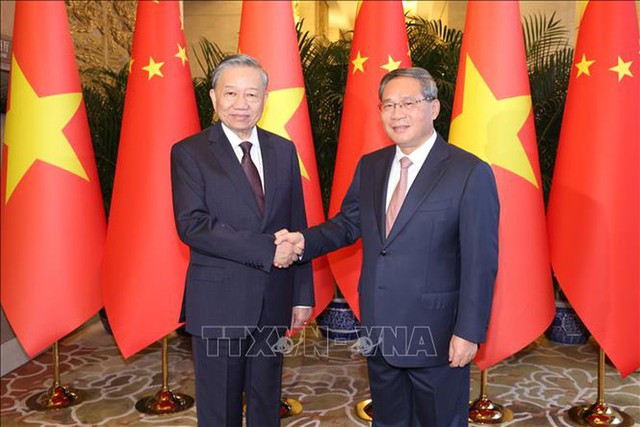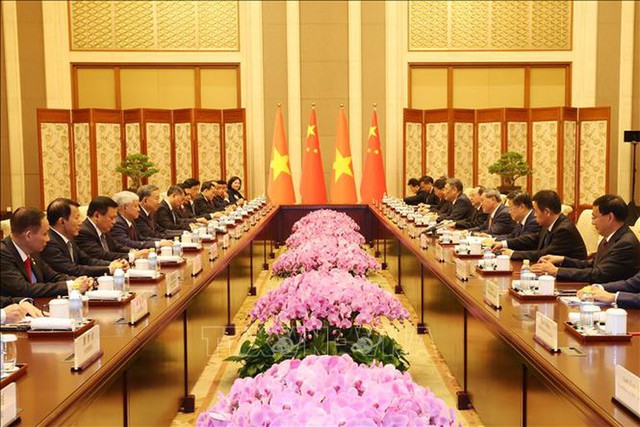Party chief meets Chinese Premier in Beijing
VGP - Vietnamese Party General Secretary and President To Lam had a meeting with Chinese Premier Li Qiang in Beijing on August 19 as part of his three-day State visit to China.

Vietnamese Party General Secretary and President To Lam (L) meets Chinese Premier Li Qiang, Beijing, August 19, 2024 - Photo: VNA
Li said the visit reflects the high importance and top priority that the Vietnamese Party and State place on the bilateral relationship.
He expressed his belief that it will create a strong impetus for the comprehensive strategic cooperative partnership between the two countries to enter a new phase with more substantive outcomes.
The Chinese Party and Government vow to support Viet Nam to comprehensively promote its reform, accelerate industrialization and modernization, and successfully build socialism suited to Viet Nam's conditions, said Li, asserting that China consistently considers its relationship with Viet Nam a priority in its policy of neighborhood diplomacy.
The Chinese Premier said both countries should maintain exchanges at all levels, and promote the role of the China–Viet Nam Steering Committee for Bilateral Cooperation in enhancing the bilateral relations following the "six major orientations".
Both nations should improve rail connection between Viet Nam and Europe via China, accelerate the feasibility study of the Lao Cai–Ha Noi-Hai Phong railway, make planning for the Dong Dang–Ha Noi, and Mong Cai–Ha Long–Hai Phong railways, and facilitate Vietnamese high-quality agro-fishery products' entry into China, said Li.
Both sides should continue enhancing their neighborliness and friendship, bolstering people-to-people exchange, implementing people's livelihood projects, working together in the fields of vocational training, and promoting the role of the Viet Nam–China Friendship Palace, recommended the host.

To Lam, for his part, reiterated that Viet Nam always regards the development of friendly neighborliness and comprehensive cooperation with China a consistent policy, a strategic choice, and a top priority in its foreign policy of independence, self-reliance, multilateralization and diversification of external relations.
Viet Nam will continue upholding the significant achievements and common perceptions reached by high-ranking leaders of both sides to elevate the comprehensive strategic cooperative partnership and build the Viet Nam-China community with a shared future that carries strategic significance, To reassured.
To welcomed China's engagement in developing three standard-gauge railway projects that connect the two nations, the Vientiane–Vung Ang railway, and the metro system in Ha Noi.
The Vietnamese leader recommended China continue opening up its market for high-quality farm produce from Viet Nam, and create favorable conditions for the country to set up its Consulate General in Chongqing, and trade promotion offices in China.
He urged China to accelerate its large-scale and high-quality investment projects with modern technologies in Viet Nam, soon pilot smart border gates, consider cooperation in payment in local currencies, and step up collaboration across the areas of science-technology, innovation, green transition, digital transformation and high-tech agriculture.
He expressed his hope that the two sides will boost cooperation in education, culture, tourism, and natural disaster prevention and mitigation, rescue and urgent response.
To suggested the two countries seriously carry out the high-level common perceptions, and the Viet Nam-China agreement on basic principles guiding the settlement of sea-related issues, and respect international law, particularly the 1982 United Nations Convention on the Law of the Sea (UNCLOS 1982).
He underlined the need to respect each other's legitimate rights and interests, promote the efficacy of the negotiation mechanisms on the sea-related issues, satisfactorily handle issues relating to fishing vessels and fishermen, well control the situation at sea, and maintain the stable, positive development momentum of the bilateral ties, as well as peace and stability in the region.
Both leaders pledged to make joint efforts to bolster political and economic confidence, and maintain regular contact at all levels.
They concurred to expand cooperation in such key areas as foreign affairs, defense and security, step up locality-to-locality linkages and people-to-people exchange.
Regarding regional and international issues of mutual concern, they agreed to jointly control and satisfactorily settle disagreements, maintain peace and stability at sea, consolidate a favorable environment for the development of each nation as well as support each other at multilateral forums and mechanisms.
The same day, To Lam had separate meetings with Chairman of the Standing Committee of the National People's Congress of China Zhao Leji and Chairman of the Chinese People's Political Consultative Conference (CPPCC) National Committee Wang Huning./.
